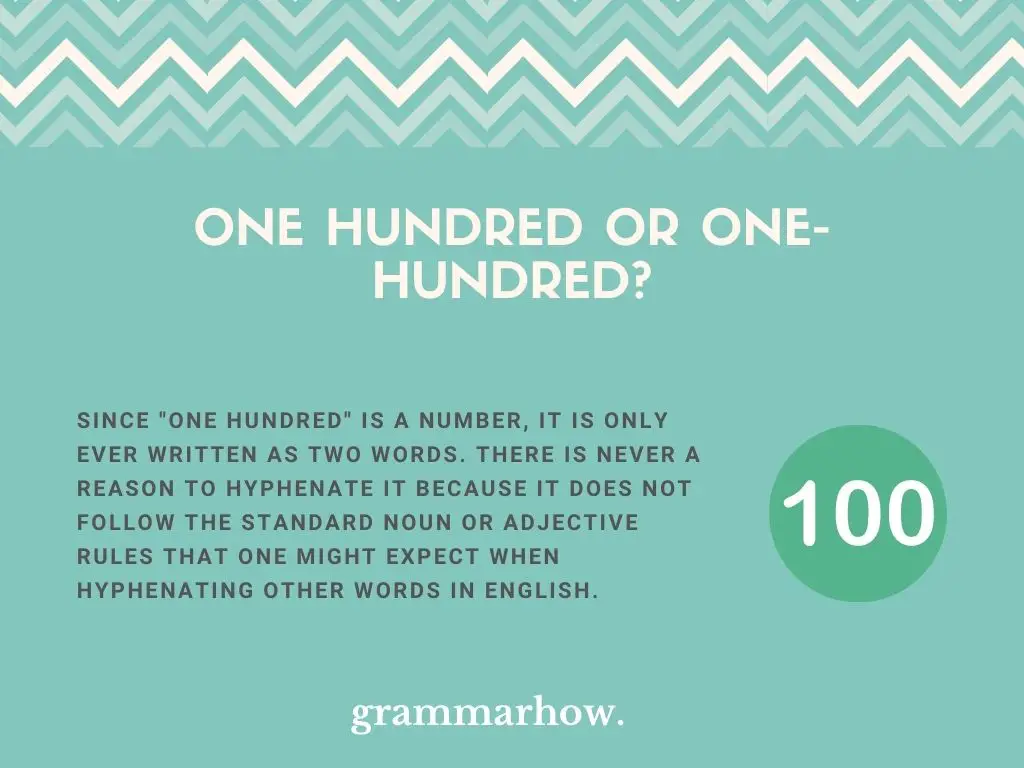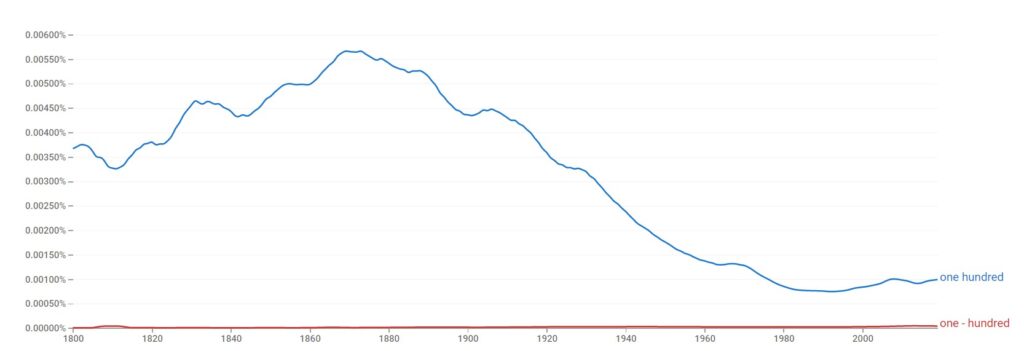“One hundred” is a number, so it doesn’t always follow the useful word-based rules we understand in English. It might help to read this article to learn whether it should be hyphenated or kept as one or two words. We’ve got the answers to help you out.
One hundred vs. One-hundred
Since “one hundred” is a number, it is only ever written as two words. There is never a reason to hyphenate it because it does not follow the standard noun or adjective rules that one might expect when hyphenating other words in English.

According to Google Ngram Viewer, “one hundred” is vastly more popular when used in writing. In fact, the hyphenated form is barely ever used, which shows that numbers simply do not follow the same rules as you may expect from words.

In The Cambridge Dictionary and The Oxford Dictionary, “one hundred” is the only listed spelling variation. It also helps to note that both dictionaries list “one hundred” as a “number,” which helps us understand more about its independent rules.
If either dictionary chose to list “one hundred” as an “adjective” or “noun,” then we might be teaching you something entirely different here. However, since it’s a number, a lot of what you’ve come to expect of standard words can be disregarded.
One hundred
“One hundred” is the only suitable spelling variation. In any case, if you’re writing the number in long-form like this, you should always write it as two separate words. There is never a reason to include a hyphen because it does not add anything to the meaning of the word.
Sometimes, we add hyphens to words when they are used to modify another noun in a sentence. Since “one hundred” is a number, that modification is always the same (it means there is one hundred of something).
Because there isn’t anything unusual about how “one hundred” interacts with another noun, there is never a need to hyphenate it. Even if we wrote it before another noun, the hyphen is still kept out of the word because all native speakers understand what “one hundred” is.
Here are a couple of examples that will show you the correct spelling:
- I have one hundred dollars, and I’m not entirely sure how I want to spend any of it yet.
- You need to have one hundred more of those before you can get out of this place.
- I think I said one hundred before, but I’m happy for you to correct me if I’m wrong.
- Wasn’t there something like one hundred soldiers in the courtyard?
In some of the above examples, we included a noun directly after “one hundred.” If it was a regular adjective, we would always hyphenate it. However, because it’s a number, the hyphen rules are ignored.
One-hundred
“One-hundred” is wrong. There is no need to hyphenate “one hundred” because it’s a number, and standard English rules do not apply. English rules apply to words in the English language, but numbers follow their own rules in most cases.
Again, everybody already knows what “one hundred” means. When they see it written (in number or word form), they know that there will be “one hundred” things. The hyphen does not add any more information that might have been missed.
Since there is only one correct form, the following examples should clear up any confusion:
- Correct: You need to have one hundred dollars to your name before you can sign up here.
- Incorrect: I know one-hundred people, and I’m sure they will all be coming to my party soon.
- Correct: The one hundred friends I met at the festival were all there again yesterday.
- Incorrect: You do not know one-hundred phone numbers off by heart. Nobody does.
“One hundred” is a number that follows different rules. Even if it’s modifying a noun, the hyphen is still grammatically incorrect.
Is “Hundred” Capitalized In The Word “One-Hundred”?
We usually include a tip about capitalizing hyphenated words at this stage of the article. However, the hyphenated form of “one hundred” is not correct, so it’s not a good habit to teach you how to capitalize it.
Nevertheless, there is no need to capitalize “one hundred” even in its unhyphenated form. It is not a proper noun, so you do not need to worry about either part of the word being in capitals.

Martin holds a Master’s degree in Finance and International Business. He has six years of experience in professional communication with clients, executives, and colleagues. Furthermore, he has teaching experience from Aarhus University. Martin has been featured as an expert in communication and teaching on Forbes and Shopify. Read more about Martin here.

